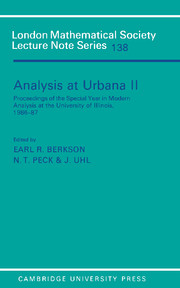Book contents
- Frontmatter
- Contents
- Acknowledgements
- PREFACE
- The C1contractions
- Factorization theorems for integrable functions
- Spectral decompositions and vector-valued transference
- Vector-valued Hardy spaces from operator theory
- Restricted invertibility of matrices and applications
- The commuting B.A.P. for Banach spaces
- The minimal normal extension of a function of a subnormal operator
- Two C*-algebra inequalities
- The generalised Bochner theorem in algebraic scattering systems
- Differential estimates and commutators in interpolation theory
- A survey of nest algebras
- Some notes on non-commutative analysis
- Some remarks on interpolation of families of quasi-Banach spaces
- An application of Edgar's ordering of Banach spaces
- Martingale proofs of a general integral representation theorem
Differential estimates and commutators in interpolation theory
Published online by Cambridge University Press: 05 September 2013
- Frontmatter
- Contents
- Acknowledgements
- PREFACE
- The C1contractions
- Factorization theorems for integrable functions
- Spectral decompositions and vector-valued transference
- Vector-valued Hardy spaces from operator theory
- Restricted invertibility of matrices and applications
- The commuting B.A.P. for Banach spaces
- The minimal normal extension of a function of a subnormal operator
- Two C*-algebra inequalities
- The generalised Bochner theorem in algebraic scattering systems
- Differential estimates and commutators in interpolation theory
- A survey of nest algebras
- Some notes on non-commutative analysis
- Some remarks on interpolation of families of quasi-Banach spaces
- An application of Edgar's ordering of Banach spaces
- Martingale proofs of a general integral representation theorem
Summary
Abstract: Associated with the construction of intermediate Banach spaces in interpolation theory are unbounded non-linear operators, Ω, which are, roughly, the differentials of the fundamental mappings used in the construction of the intermediate spaces. We look at the theory of these operators and their applications to interpolation theory and to other topics in analysis. We see that the mapping properties of Ω are strongly related to the structure of the interpolation scale. We also see that computations using Ω are closely related to certain computations in the theory of hypercontractive semigroups.
Introduction and Summary: Several constructions in interpolation theory start with a pair of Banach spaces (for example, L1 and L∞) and construct a parameterized family of spaces (in the example, Lp, 1 < p < ∞) which are, in an appropriate technical sense, intermediate to the original pair. In particular it will be true that if a linear operator T is bounded on both spaces of the starting pair, then T will also be bounded on the intermediate spaces.
Associated to the construction of intermediate spaces are mappings Ω, generally unbounded and non-linear, which can be obtained by differentiation with respect to certain parameters used in the construction of the intermediate spaces.
- Type
- Chapter
- Information
- Analysis at Urbana , pp. 170 - 220Publisher: Cambridge University PressPrint publication year: 1989
- 11
- Cited by



